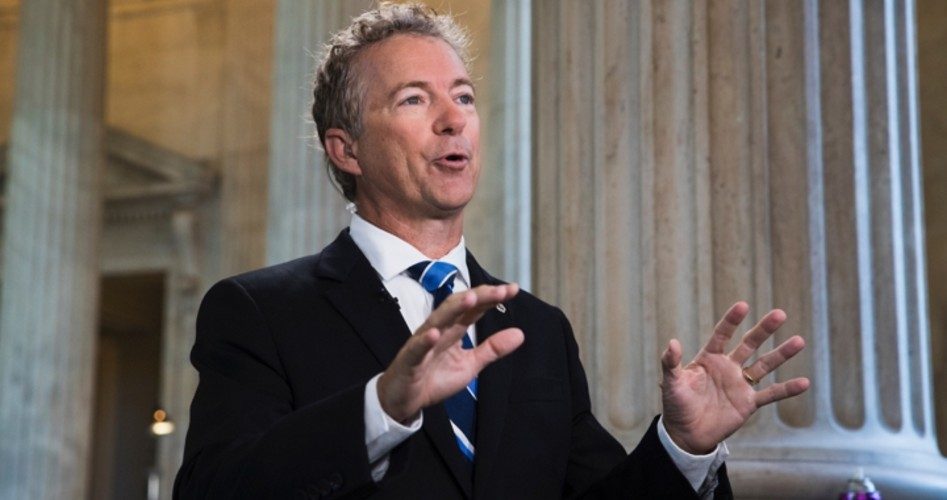
Senator Rand Paul (R-Ky.) says President Donald Trump may soon take executive action to alleviate one of ObamaCare’s major failings: the 27 million Americans who are still uninsured despite the law’s mandates and subsidies.
“Government can be a force for fixing healthcare — mostly by getting out of the way,” Paul, an ophthalmologist, wrote in an op-ed for The Hill.
Paul thinks the federal government should get out of the way by allowing various private associations, not just employers and unions, to obtain group health insurance, and to do so across state lines. He believes the Department of Labor has the power to permit such association health plans simply by changing some regulations. The senator says Trump has “often” told Paul he agrees with him on this matter and has already ordered the department to work with him to accomplish it.
Currently, people buying insurance as individuals or as members of a small group have very little leverage over insurance companies, so they get socked with high premiums and deductibles and meager benefits — a situation that ObamaCare has only exacerbated. If larger groups such as trade associations, churches, and civic or activist organizations were permitted to obtain health coverage for their members, they would then be in a position to negotiate the same kinds of insurance deals that large employers get, including “protections against pre-existing conditions and high prices,” Paul contended in a Louisville Courier-Journal op-ed.
ObamaCare, of course, was supposed to solve these problems by getting more people to buy insurance, thereby spreading costs around and making it possible for insurers to cover those with expensive conditions. Unfortunately, Paul wrote, it did so through “job-killing mandates and burdensome regulations” that he argues “would be unnecessary” if association health plans were permitted “because the consumer would have power over the big insurance companies.”
“It’s the same principle as Wal-Mart,” Paul told WKU Public Radio Tuesday. “Wal-Mart can buy in such large bulk that you can get milk for a very reasonable price often just barely above their cost, and they do it because they have such large buying power.”
Paul maintains that association health plans are legal under the 1974 Employee Retirement Income Security Act (ERISA), which regulates employer-sponsored health plans. “But the current association rules are strict and the hoops that people have to jump through to join them and comply with regulations are still too steep,” he penned. “Additionally, not enough groups and individuals are even eligible to form or join these plans.”
The senator claims the law’s original language allowed far more latitude than the Labor Department’s subsequent regulations, which were undoubtedly influenced by Big Business, Big Labor, and Big Insurance. While he would still prefer to codify his interpretation of ERISA as part of an ObamaCare replacement bill, Paul wrote that he wants the Trump “administration to declare this their new policy at once and finish up the new rules that would need to be in place.”
Such a policy would not be a panacea for the healthcare system, which Paul noted “was broken before ObamaCare.” The system would still be riddled with mandates and regulations and subsidies that both reduce supply and increase demand, thereby jacking up prices. But the policy might help Americans who don’t work for large employers cope with these high prices by reducing the cost and increasing the availability of insurance. That, in turn, would help loosen the connection between employment and insurance, easing one of Americans’ biggest fears: losing their job and their health coverage in one fell swoop.
Because the policy would still leave decisions about which organizations could buy health insurance, and the terms under which they could do so, in the hands of federal bureaucrats, it hardly passes strict constitutional muster. However, to the extent that it loosens federal regulations, it at least moves things in the right direction. Plus, if it succeeds in insuring a significant number of Americans, it could help pave the way for ObamaCare repeal.
Paul told WKU he plans to discuss the matter further with Trump this week. Whether those discussions lead to positive policy changes remains to be seen.
Photo: AP Images



